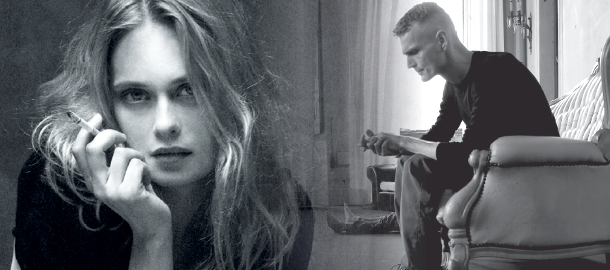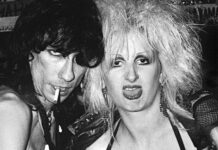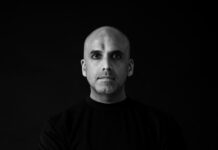Text: Kristoffer Cornils, Pictures: Marcus Paarmann, Burnt Friedman
A German translation of this interview has been published in Groove 154 (May/June 2015).
Throughout their careers as musicians, Dasha Rush and Burnt Friedman have both – either explicitly or implicitly – established links to other art forms within their work. Both particularly take an interest in poetry: The Russian-born Rush has subtitled her new album Sleepstep as „Sonar Poems For My Sleepless Friends“, while Friedman (birth name: Bernd Friedmann) has recently worked with the actor and spoken word artist Daniel Dodd-Ellis on an LP called Cease To Matter. Their new collaboraitive „Clock EP“ has just been released on Friedman’s own Nonplace imprint. We talked to Rush and Friedman about their approaches towards using lyrics and the relation between poetry and electronic music.
Dasha, Burnt, how did you both come to the decision to inorporate poetry into your music?
Dasha Rush: I was reading a book by Edgar Allen Poe, fell asleep over it and had a dream. In this dream, which was more like a semi-dream, he was telling me: ‘You have to write me an answer!’ ‘What kind of answer?’, I asked, but then woke up. My answer was not a direct one to what I had been reading, but rather an abstract one which is dedicated to the author. I don’t think you can really call it poetry. Sure, it can be poetic in a sense, but it doesn’t follow a classic structure. Poetry has rules, you know. So it was more of a poetic self-expression which had to happen trough words rather than through sounds, or a combination of that, I guess.
Burnt Friedman: I have been interested in using all kinds of text material in the nineties with a project called Some More Crime which existed for about five years. We made extensive use of found text material from video tapes; interviews or speeches by people explaining themselves about matters of violence, crimes mostly, or media footage about those crimes which was then cut-up. We did this to make one thing clear: Media doesn’t present a coherent reality, but rather distracts from such a coherence and from the actual story. We brought back order to this text material by combining it with music and rhythms. It was 100% found material which we used instead of singing or writing lyrics of our own. It was an easy way of replacing the work of a poet or an author by creating new content through cut-up techniques.
Rush: Like a lyrical collage.
Friedman: Yes. It was quite dense.
This is interesting, as the cut-up is a literary technique, made famous by William S. Burroughs. Burnt, did you approach your work with Daniel Dodd-Ellis in the same way?
Friedman: We worked on the lyrics together, but in a similar way. What you hear on the record has undergone lots of edits, so it’s never the poem or the text we originally created. There’s always a random process involved. Words get messed up and all of a sudden meaning comes together, by chance if you like. It can go totally wrong, but in most fruitful cases we achieve better results by letting the words go in their own direction, by shifting and pushing things around on the computer or even by confusing words on the paper from which Daniel reads.
Video: Burnt Friedman w/ Daniel Dodd-Ellis – Skies Okay Blue
Rush: A randomiser for semantics! A chaos of words. Not chaos maybe, but a random constellation of words from which new meaning emerges, a sort of pool of meanings. One word might change everything! That’s very interesting!
Is your working process similar, Dasha?
Rush: I wouldn’t call it a randomiser. I have a particular thought or maybe a mood which I would like to translate; an atmosphere which also could be expressed through words. It doesn’t have to have a clear meaning, but still it has. I didn’t do this very often, so it’s a new experience for me. Before, I used spoken words on singular tracks, but now it’s a whole story. It’s like a little fairy tale; a fairy tale which transmits the mystery and ambience of things. Of course a fairy tale has a morale at the end and mine doesn’t, but it has fairy tale-like atmosphere to it. Spoken words are an instrument for me to express what I want to express. It was not like I wanted to write poems, that more or less happened during the creation of the album.
However, the album title mentions “sonar poems”. What does that mean?
Rush: Basically, the term refers to a poem of sound. It’s a musical dedication, because some of those tracks are dedicated to my “sleepless friends”. Now, who are those friends? I found one interpretation very funny in which someone said it was about my friends who go to clubs at night. (laughs) But it’s not! It’s Albert Einstein, Edgar Allen Poe and some people close to me who have passed away. “Sleepless” here means “with an awake mind”. The Sonar Poems For My Sleepless Friends are dedicated to people whom I admire.
Video: Dasha Rush – Time Whispers & Albert
Burnt, in the context of your work with Daniel Dodd-Ellis the terms “sound poetry” and “poetry tracks” are used. What do you mean by that – and would you make a distinction between lyrics and poetry?
Friedman: It’s lyrics, Gedichte. I don’t see a difference. A Gedicht does not need to necessarily have a rhyme or follow any rules.
Rush: I guess it’s a question of terminology. Lyrics are not necessarily poetry in the classic sense if you have non-rhythmical structures of prose. If it has a structural sequence, it is poetry. But who did define that anyway?
Friedman: Exactly.
Rush: Poetry might have certain rules, but poetic meaning is something completely different. Words can be poetic without forming a poem. Lyrics can be poetry, yes.
Friedman: Or rapping. Spoken words used instead of singing, instead of expressing emotions.
Rush: But poems can be emotional! Or meaningful, or even senseless too – just sound. When I hear a foreign language that I don’t understand, I hear its musicality. And then it somehow makes sense.
„When I hear a foreign language that I don’t understand, I hear its musicality.“ Dasha Rush
Friedman: That is a crucial point, because with a certain language the artist accepts the obvious limitation of a piece of art. So what do you do as an artist when you deliberately want to use words and lyrics? You either have to accept the limitations like German pop singers. Grönemeyer for example is an exception, quite recently he sang of a Gang Of Four song, which is astonishing if you take into account that German singers are not at all popular outside of Germany apart from the ones who are recognized for being exceptionally German like Rammstein or Kraftwerk.
Rush: But Kraftwerk also used different languages, like French and English!
Friedman: Yes, they have adapted. But their original version of the song “Autobahn” was a number one hit in America and it was in German. Which for the global audience was the exotic aspect of Kraftwerk.
Rush: I think Kraftwerk is not the best example, because the words in “Autobahn” are so few that it is accessible to many people.
You were talking before about how different languages can somehow make sense – did you know that the US audience expected Kraftwerk to be a sort of Beach Boys rip-off? All they heard was “We have fun, fun, fun on the Autobahn” instead of “Wir fahr’n, fahr’n, fahr’n auf der Autobahn”.
Rush: (laughs) I didn’t know that!
Friedman: To get back to my point: Either you decide for the limitation and can’t communicate your issues to a wider audience or you decide for the voice of the imperial language, English. I have always been listening to English lyrics and I’ve always wanted to use lyrics, but you have to accept the power of the emperor. Also you will have problems because you can’t express yourself properly in a different language. So it’s better to shut up than using lyrics! The only way to transcend place and time, locality and history, would be to produce instrumental music.
Rush: I would disagree with that, because a word also reflects a certain time. It doesn’t matter if it’s your mother tongue. I have used French and English and of course I don’t know them perfectly, but naturally, if you use other languages, you will start thinking in those languages. My answer to Poe was inevitably in English! You express what you feel and experience in a certain time and thus contribute to history. I disagree that we should only make instrumental music.
Friedman: I agree, you can’t translate poems. If you tried to translate a poem by Paul Celan, you would have to use different words to put it into a spiritual context, but not in a literal context. That’s how translators deal with his poems. If I had an idea in German, like a wordplay for example, I would have to accept that limitation. However, if you write music, you create a piece of art and you don’t want it to be limited to the borders of your socio-cultural background, but want to step beyond. Like scientists. Albert Einstein would be useless if what he said wasn’t true on a universal level.
Rush: I think language is not the only medium that creates certain borders. Somewhere in Africa electronic music would sound strange to a lot of people, they wouldn’t understand it. It’s also about sounds, instruments, performance and composition. Sometimes a piece cannot be understood or felt because it sounds too different and some people might reject it for that.
Friedman: That sounds agreeable, but I don’t think it’s a matter of the culture than rather the individual. Sound can be understood anywhere by anyone. It’s not about cultural determination. On the other hand, it’s very easy to connect far away cultures through music. There’s more in common than there is not.
Rush: Yes, I agree. But when you are interested, you are attentive towards different sounding music. A person who is not particularly into music might just say ‘that sounds weird!’. We all have a cultural influence in us, if we want it or not. Language is not the only limitation, sometimes we are limited by our own cultural perception of musicality. Some people just reject anything that sounds different or not familiar to them. I have encountered that, too.
Video: Burnt Friedman w/ Daniel Dood-Ellis – Clock
When Techno emerged, it was criticised for allegedly being apolitical – which of course makes no sense if you look at projects like Underground Resistance – as there are hardly any or no lyrics at all. Is it possible to make a statement purely through sound?
Friedman: I believe that the power of music is so much stronger than any political expression. Simply because it can transcend cultural backgrounds. All political implications would limit it to a small timeframe in which only a certain amount of people would understand the message correctly. It would also be restricted to a specific locality.
Rush: Some people have the need to express their reflections on reality which would be political in the case of war, for example. Maybe you do need to express how horrible it is musically. I think it’s okay that this exists, but the essence of music exists beyond politics and all its frames.
Friedman: It can also be political in a different sense. Look at Laibach, where it’s not the absence of the political, but the overrepresentation of the political content. People, especially intellectuals, would ask: ‘Can we accept Laibach?’, as they come across like a fascist group. ‘It’s so brutal, so what should we do if right-wingers applaud this kind of music?’ It’s always about the effects of the music, no matter what the content is. That is what makes music so radical! That is why in a way Techno was so political: because it was totally apolitical. (laughs) It was recognised as a political power, both by those who came to dance and by those who were afraid that the youth would grow up and not have an opinion. It’s about what you project into it.





